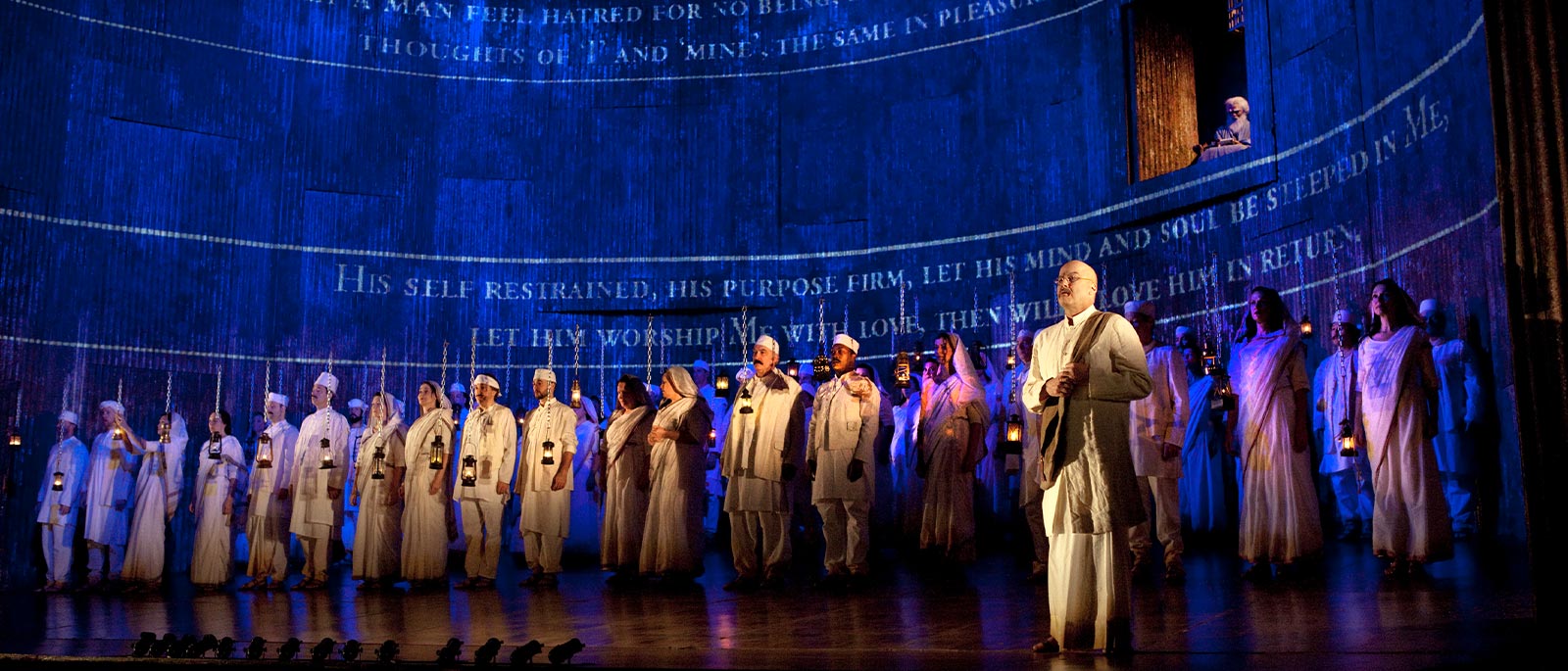
Philip Glass
Satyagraha
Monday, August 30, at 7PM
Conductor
Dante Anzolini
Miss Schlesen
Rachelle Durkin
M. K. Gandhi
Richard Croft
Mr. Kallenbach
Kim Josephson
Parsi Rustomji
Alfred Walker
Production
Phelim McDermott
Associate Director and Set Designer
Julian Crouch
Costume Designer
Kevin Pollard
Lighting Designer
Paule Constable
Video Design
Leo Warner and Mark Grimmer for 59 Productions
Live in HD Director
Barbara Willis Sweete
Co-production of the Metropolitan Opera and English National Opera, in collaboration with Improbable
Production a gift of Agnes Varis and Karl Leichtman
Additional funding from Stanley, Marion, Paul, Sara, and Eddie Bergman; American Express; the National Endowment for the Arts; and Henry Schein, Inc.
Revival a gift of Mr. and Mrs. Vikas Kapoor, The Goatie Foundation, and the Satyagraha Revival Funders Committee
Act I: Tolstoy
Scene 1 The Kuru Field of Justice a battle is impending between two royal families, the Kuruvas and the Pandavas. Lord Krishna instructs Prince arjuna to be wise in matters of death and duty. Gandhi draws a parallel between the mythic confrontation and the present one.
Scene 2 Tolstoy Farm (1910) Gandhi has initiated the first collective action among south Africa’s Indian residents and established Tolstoy Farm where families live a simple life in harmony with each other. he proclaims that work is preferable to idleness, if one’s motives are free from desire.
Scene 3 The Vow (1906) The British government proposes a law for registration of all Indians, the Black act. at a public meeting, a resolution is drawn up stating that all will resist the act unto death. The satyagrahis have come to a turning point: the life-and-death terms of the resolution call for a step beyond ordinary majority vote. Only a vow taken in the name of God will support an individual’s observance of the resolution.
Act II: Tagore
Scene 1 Confrontation and Rescue (1896) Gandhi has spent six months in India talking about conditions in south Africa. There is a wave of opposition among the European population when he returns to Durban, and a violent crowd pursues him on through the town. a European supporter declares Gandhi’s opponents fools, corrupted by pride and hypocrisy and escorts him home.
Scene 2 Indian Opinion (1906) The weekly publication of Indian Opinion is central to the satyagraha movement, and the paper reflects the growth of its principles. setting a standard with a strong internal policy, it becomes a powerful weapon for the struggle. Gandhi’s wife and his associates restate the importance of working for a cause rather than for one’s own gratification.
Scene 3 Protest (1908) Movement leaders have been sentenced to jail for refusing to leave south Africa. The community resolves to protest by filling up the jail, getting themselves arrested for various offenses. The government proposes to repeal the Black act if the majority of Indians undergoes voluntary registration, but then puts the law into effect anyway. The satyagrahis issue their own ultimatum: if the act is not withdrawn, Indians will burn their certificates. When the government refuses, the certificates are set ablaze. Gandhi preaches about the importance of bearing no hatred toward anyone.
Act III: King
New Castle March (1913) When the government breaks its public promise to repeal two racially discriminatory laws, a miners’ strike is organized. Led by Gandhi, the miners and their families join the satyagraha army and march to the Transvaal border. If arrested, the 5,000 would flood the jails. If allowed to proceed to Tolstoy Farm, they would prolong the strike. The army is instructed to stand any test without opposition. talking about the soul’s return to Brahma, Gandhi proclaims: “The Lord said, I have passed through many a birth and many have you, I know them all but you do not. For whenever the law of righteousness withers away and lawlessness arises, then do I generate myself on earth, thrusting the evil back and setting virtue on her seat again.”
The Summer HD Festival is generously supported by The Robert W. Wilson Charitable Trust.
The Met: Live in HD series is made possible by a generous grant from its founding sponsor, the Neubauer Family Foundation. Digital support of The Met: Live in HD is provided by Bloomberg Philanthropies. The Met: Live in HD is supported by Rolex.
Support Extraordinary Opera
You may also give by texting METFESTIVAL to 44321. Standard text messaging rates apply.